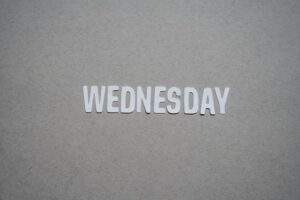Hello and welcome to… Thursday. Seriously, it’s Thursday again? I wrote about my issues with Thursdays in this post, where I determined not to wish the day away, and this one, where I was reminded that it’s important to have a sense of humor. This week, I’ve been thinking about my number one coping strategy for life.
In order to explain how I got to this point, I have to tell you about my dad. I know people often complain about their parents, but my dad was truly one of the most difficult people in the world. He was hard to communicate with, said all sorts of weird and inappropriate things, and would unexpectedly become angry and defensive.
A “conversation” with my dad was more like a lecture- he could tell you all about Charlie Parker or Abraham Lincoln- or an interview. If he saw me with a book (which I avoided as much as possible, trying to slink around with my books unnoticed) he would ask for the title, the main character, the plot and- my favorite- the theme of the book. If the book was on the lighter side, he would suggest that I read something more challenging.
Here’s an example of an inappropriate comment. I was in my early twenties and had just broken up with a boyfriend. My dad said “I just can’t believe you broke up with Andy!” I asked why he was so surprised and he said “Well, I always thought Andy would break up with you!” OH? And why is that? His response: “Because Andy was so good looking.”
I mean… who says that? Out loud? To their daughter? Another time I told him what I had decided on for a career and he said “Oh well… you can always get married.” I could go on and on, but you get the idea.
As you can imagine, I grew up with a lot of anger towards him. And guilt. It was confusing- every book and movie seemed to show loving father-daughter relationships. Even when daughters were fighting with their dads, it still seemed like they were communicating in a way that my dad and I just couldn’t. Every once in a while I would try to get past our adversarial relationship and have a real heart-to-heart talk with him, but the only way I can explain it is, if the line of communication was like a chain between us, there was a link mysteriously missing.
This went on for almost his whole life. Then one day, when my dad was in his eighties, I read an article about someone with Asperger’s Syndrome. This person sounded almost identical to my dad, and I literally felt a chill going down my spine.
Suddenly all the pieces fell into place. Of course my dad would never have known he had Asperger’s, because it wasn’t a diagnosed condition until he was well into his adult years. But it was clear to me that’s what he had, and I realized how frustrating his life must have been, how he must have struggled with all his relationships, and wondered why everyone always got so angry with him.
Most importantly, I realized that none of his “terrible” comments ever had anything to do with me at all- it had always been about him, and his inability to communicate properly. There was nothing for me to be angry about, because he truly couldn’t help it.
From that day on, I felt like I was living in a parallel reality. My dad would say something strange to me, and I could imagine my old reaction, what I would have said back and how it would turn out, but I could also see things in this completely new light, where he was doing his best with the limitations he had. Since I didn’t take it personally, I didn’t get angry, and when I stopped being angry with him, he became less antagonistic towards me as well.
I only had my dad for one more year after that, but for that year we were the closest we had ever been. We weren’t truly close- there was still that missing link in the chain that was never going to change- but the way I would describe it is, it felt like we were on the same team for the first time, instead of fighting against each other.
If I could navigate through one of the most difficult relationships imaginable to a satisfying outcome, I feel like I can handle anything that my boss, co-workers, or challenging clients can throw my way. The truth is that nothing is personal against us- other people are all grappling with their own issues, and whatever they say to us is all about them. Life is so much easier when you realize that.
Julie Piatt once said, “The most difficult relationship of your life is also the most important.” From my dad, I learned to take nothing personally. After all the years of arguing, anger, and hurt feelings, my dad would be astonished- and pleased, I’m pretty sure- if he knew that my relationship with him was the most important, in the end.
Do you have a difficult person in your life?
Which relationship do you think is your most important one?






17 Responses
This is beautiful. Absolutely beautiful – the writing, the sentiment, the conclusions. It was so brave of you to forgive and change your perspective on such a challenging relationship. I suspect teenage-Jenny would have been shocked that current-day-Jenny would say the relationship with her father was the most important in the end.
It took me a minute to place the parallel, but then it came flooding back – a few months ago I read Ladyparts, by Deborah Copaken, who discusses her husband’s diagnosis (at age 44, I believe?) of Asperger’s. There was an unbelievable amount of pain (literally and figuratively) in their relationship, but it became so much more bearable once she understood that his strange and hurtful behaviours weren’t actually because of her personality or some character flaw. Life-changing realizations that allowed her to move forward empowered and liberated.
Thank you so much Elisabeth! You’re right- as a matter of fact if someone told teenage-Jenny that, I would have become extremely angry, ha ha. Thank goodness we’re not teenagers forever.
I haven’t read that book but now I want to! It sounds really interesting, and something I can definitely relate to.
Jenny, this was beautiful. Thank you so much for sharing this very personal experience with us. It’s especially valuable as you were able to identify what was “wrong” with your Dad and were able to change your own behavior to achieve a closer relationship with him.
Mental illness in all its forms is one of the most difficult things to accept, especially if we don’t know that someone’s behavior is so fundamentally impacted by it. Once we know and understand why someone behaves a certain way, it’s much easier to be understanding and kind and to mitigate the impact on the people around them. It doesn’t mean that it can be still frustrating, but it relieves anger and disappointment towards the person at least to a degree.)
I am so glad you could have a good relationship with him before he died — for your own sake!
Thank you San! Yes, it was only for one year, but my memories of my dad would be quite different if I had never had that epiphany.
Your comment reminds me of the advice- always be kind, because everyone around you is fighting a great battle (I’m paraphrasing poorly.) You just don’t know what other people are going through.
Oh, this rang a bell with me so much. I think it’s lovely that you were able to reframe the interactions you had with your father in light of new discoveries. I also think it’s KIND and GENEROUS of you to apply what you’ve learned about him to others in your life.
My father was also quite difficult and it was because, I think, he was in chronic pain. I have tried reframing interactions with him like you (because being in pain all the time is SO AWFUL and I feel bad when I think about how he must have suffered), but I haven’t been as successful as you. However, one story that has become a joke in our house: My husband, T, and I were newly engaged when we went to a family event. My father was talking with a few of my uncles and T overhears the uncles ask my father what he thought of T. My father responds, “well, I guess you just have to let them sink or swim on their own, you know?” What a ringing endorsement! Ha ha. My husband and I now always refer to ourselves as sinking and swimming.
That comment is so funny, because it’s just like something my dad would have said. As a massage therapist, I come in contact all the time with people in chronic pain. Yes, something they’re not very pleasant! When someone comes in and acts like a jerk, I remind myself that they’re in pain. You could say I’m being generous, but really the person I’m helping the most is myself. Life is much better when you’re not angry all the time.
What a beautiful peice of writing. I can feel the cold running down the spine almost. I guess the light bulb when you read that article and how much it changed your relationship must have been such a relief. And how wonderful that you git to spend at least this one year with him and with a much better relationship.
This story of yours just shows once more how important educating is. If you know about things like that you can act differently. you can try to integrate, to understand to connect. Just today I saw a Netflix show about vacation rentals in there was one very unique one in Montana called Erics farm where a mother created a world for her son with Aspergers so that he and others like him can live and work and be part. It was really sweet.
Thank you Tobia! Sometimes I wish I had made the discovery earlier- but maybe I wasn’t ready to hear it until that moment.
Oh my goodness, in the first couple of paragraphs, I thought “her dad sounds like he has Asperger’s” – and then you said it! I think that is such a freeing thing to know. His unkind comments were not to do with you at all, but were just his way of processing. I am so happy for you that you were able to heal from that fraught relationship.
Beautiful post.
I also had a difficult father and my relationship with him was not the best. Then growing up I realized that I also was not an easy son and a very understanding person. Now I regret not having done more to facilitate our relationship.
On the other hand, I had the best mom in the world!
My mom was great also 🙂
Becoming a parent myself also helped me understand my own parents more! And it also puts things in perspective- you know your son loves you, even if you don’t always get along. So… your dad knew you loved him as well.
Excellent post, Jenny!
Amazing how a shift in perspective can change our behavior for the better.
I like that philosophy, to take nothing personally. It makes life so much easier!
It really does, Catrina. I know it can be hard to do sometimes, but it will lead to a happier life!
Thanks for sharing.
Take nothing personally. Definitely good advice but so hard sometimes.
It is really hard- but I’ve found that like anything else, it’s a habit that can be built. Even with my epiphany about my dad, I’ll still have moments where someone says or does something that makes me angry and defensive- I have to remind myself that it’s them, not me!
This is really beautiful, Jenny, and such a good way to reframe a difficult relationship in your life. I really commend you for being able to take this hard relationship and find ways to better understand your father and why he does the things he does. Like you, I also have/had a difficult relationship with my dad, to the point that I had to estrange myself because it was such a volatile relationship. I have self-diagnosed him with narcissistic personality disorder, which helps me to better understand the way he approaches life. My dad is still alive and it’s weird to know he’s out there, living his life but doesn’t know me, my brother, or his two grandkids at all.
Stephany- I know someone with NPD and it’s REALLY difficult. It’s a close friend’s ex-husband, and that’s why they got divorced. It’s even more difficult than Asperger’s, and from what I understand, usually the best thing you can do is remove yourself from the relationship. It’s a shame for you though- a daughter should have a father in her life. Luckily you have an amazing mom!